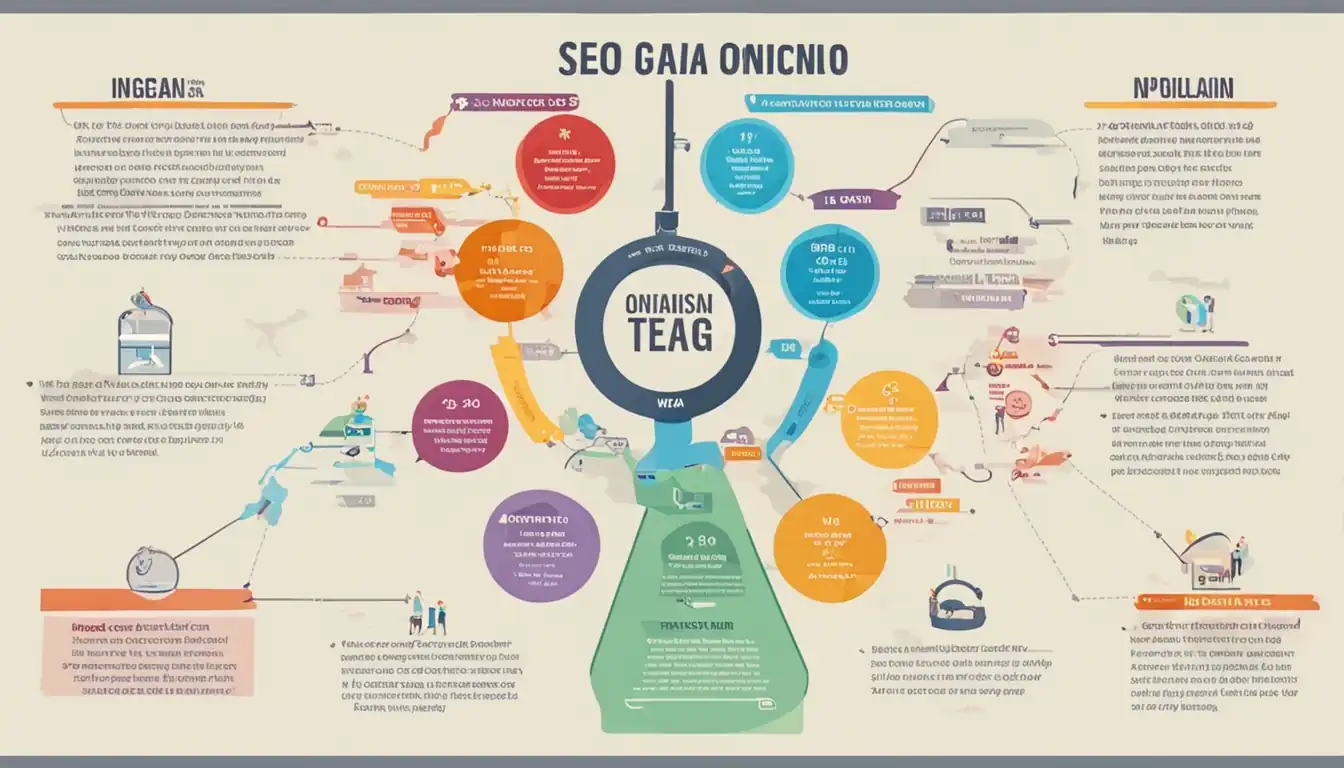Mastering Meta Tags for SEO Success

In the vast world of SEO, mastering meta tags is like finding the hidden treasure map to boost your website's visibility. These little snippets of code hold the key to unlocking higher search engine rankings and attracting more organic traffic. Understanding how meta tags work and knowing how to optimize them can make all the difference in your SEO success. So, let's dive into the art of crafting effective meta tags that will set your website apart from the competition.
Understanding Meta Tags

Meta tags are snippets of text that describe a webpage's content. They are placed in the HTML code of a page and are not visible on the actual webpage itself. Meta tags provide information to search engines about the content of a webpage, helping them understand what the page is about.
The Basics of Meta Tags
There are several types of meta tags, but some of the most important ones for SEO include:
- Title Tag: This is the title of a webpage that appears in search engine results. It should be relevant to the content on the page and contain keywords.
- Meta Description: This is a brief summary of the content on a webpage that appears in search engine results. It should be compelling and informative to entice users to click.
- Meta Keywords: While not as important as they used to be, meta keywords are still used by some search engines to understand the content of a webpage.
- Viewport Meta Tag: This tag helps ensure that webpages are displayed correctly on different devices and screen sizes.
How Meta Tags Influence SEO
Meta tags play a crucial role in SEO success because they help search engines understand the content of a webpage, which can improve its visibility in search results. Here are some ways meta tags influence SEO:
- Keyword Optimization: Including relevant keywords in meta tags can help improve a page's ranking for those keywords.
- Click-Through Rate: A well-crafted meta description can increase click-through rates from search engine results pages.
- User Experience: The viewport meta tag can enhance user experience by ensuring webpages display correctly on all devices.
Remember, while meta tags are important for SEO, they should always accurately reflect the content on your webpage. Misleading or irrelevant meta tags can harm your website's credibility and rankings.
Types of Meta Tags You Should Know
Meta tags play a crucial role in optimizing your website for search engines. Understanding the different types of meta tags and how to use them effectively can greatly impact your SEO success. Here are the key meta tags you should know:
Title Tag – The Front Window of Your Web Page
The title tag is one of the most important meta tags for SEO. It appears as the clickable headline in search engine results and serves as the first impression of your webpage. To optimize your title tag, make sure it accurately reflects the content on the page, includes relevant keywords, and is compelling enough to attract clicks.
Description Tag – Setting the Stage for Your Content
The description tag provides a brief summary of the content on your webpage. While it doesn't directly impact rankings, a well-crafted description can entice users to click on your link in search results. Make sure to include relevant keywords and create a compelling description that accurately represents the content on your page.
Robots Tag – Directing Search Engine Crawlers
The robots meta tag allows you to control how search engine crawlers interact with your webpage. By using directives like "noindex" or "nofollow," you can instruct search engines on whether to index or follow links on your page. This can help prevent certain pages from being indexed or ensure that only important pages are crawled by search engines.
Incorporating these key meta tags into your SEO strategy can help improve your website's visibility in search engine results and drive more organic traffic to your site. Mastering meta tags is essential for achieving SEO success in today's competitive online landscape.
Crafting Effective Title Tags

Why Every Word Counts
Title tags are one of the most crucial elements of on-page SEO. They serve as a concise description of what a webpage is about and play a significant role in determining the page's relevance to search queries. Every word in a title tag should be carefully chosen to accurately reflect the content of the page while also enticing users to click through to your website.
Tips for Writing Compelling Title Tags
- Keep it concise: Title tags should ideally be between 50-60 characters long to ensure they display properly in search engine results.
- Include relevant keywords: Incorporate relevant keywords that accurately describe the content of the page to improve its visibility in search results.
- Be descriptive: Clearly convey what the page is about to entice users to click through.
- Avoid keyword stuffing: While it's important to include keywords, avoid overloading your title tag with them as it can harm your SEO efforts.
- Create unique titles: Each page on your website should have a unique title tag that reflects its specific content and purpose.
By following these tips, you can craft effective title tags that not only improve your SEO but also attract more clicks from users searching for relevant information.
Optimizing Your Meta Descriptions
The Art of Creating Engaging Descriptions
Crafting compelling meta descriptions is a crucial aspect of SEO. These short snippets appear below the title tag in search engine results and can greatly impact click-through rates. Here are some tips for creating engaging meta descriptions:
- Be Concise: Keep your meta descriptions under 160 characters to ensure they are fully displayed in search results.
- Include Keywords: Incorporate relevant keywords to signal to search engines what your page is about.
- Call-to-Action: Encourage users to click by including a clear call-to-action.
- Unique Value Proposition: Highlight what sets your content apart from others to entice users to click through.
Common Mistakes to Avoid in Meta Descriptions
Avoid these common pitfalls when crafting your meta descriptions:
"Stuffing" Keywords: Overloading your meta description with keywords can make it sound unnatural and spammy.
Duplicating Content: Each meta description should be unique and tailored to the specific page it represents.
Misleading Users: Ensure that your meta description accurately reflects the content on the page to avoid disappointing users who click through.
By following these guidelines, you can optimize your meta descriptions for maximum SEO success.
Advanced Meta Tag Strategies

Using Schema Markup to Enhance Visibility
Schema markup is a powerful tool that allows search engines to better understand the content on your website. By incorporating schema markup into your meta tags, you can provide search engines with more detailed information about your content, leading to improved visibility in search results.
Key Points:
- Schema markup helps search engines display rich snippets in search results.
- It provides additional context about your content, such as reviews, ratings, and event details.
- Implementing schema markup can boost click-through rates and overall SEO performance.
Leveraging Open Graph Tags for Social Media
Open Graph tags are meta tags specifically designed for social media platforms like Facebook and Twitter. By optimizing these tags, you can control how your content appears when shared on social media, increasing engagement and click-through rates.
Key Points:
- Open Graph tags allow you to customize the title, description, and image that appear when your content is shared.
- They help ensure that your content looks appealing and informative on social media feeds.
- Optimizing Open Graph tags can lead to more shares, likes, and traffic from social media platforms.
Implementing Robots Meta Tags Correctly
Robots meta tags play a crucial role in guiding search engine crawlers on how to interact with your website. By implementing these tags correctly, you can ensure that your content is indexed and ranked appropriately.
Understanding Indexing and Follow Commands
The "index" directive tells search engines to include a page in their index, while the "follow" directive instructs them to follow the links on that page. It's important to use these commands strategically to ensure that your most valuable pages are being indexed and crawled effectively.
Utilizing Noindex and Nofollow: When and Why?
The "noindex" directive tells search engines not to index a particular page, while "nofollow" instructs them not to follow any links on that page. These directives are useful for pages like thank you pages, login pages, or duplicate content that you don't want indexed in search results. It's essential to use these tags judiciously to prevent dilution of your site's authority and relevance.
Monitoring and Measuring the Impact of Your Meta Tags
Meta tags play a crucial role in SEO success, but their impact needs to be monitored and measured to ensure they are effectively contributing to your website's visibility. Here are some key steps to help you track and evaluate the performance of your meta tags.
Tools for Tracking Your SEO Progress
Utilizing the right tools can make it easier to monitor the impact of your meta tags on search engine rankings. Here are some popular tools that can help you track your SEO progress:
Google Search Console: This free tool provided by Google allows you to monitor your website's performance in Google search results, including tracking how often your site appears in search results and which queries lead to clicks on your site.
Google Analytics: Another essential tool from Google, Google Analytics provides valuable insights into user behavior on your website, helping you understand how visitors interact with your content.
SEMrush: A comprehensive SEO tool that offers features such as keyword research, backlink analysis, and competitor tracking, SEMrush can also help you monitor the performance of your meta tags.
Moz Pro: Moz Pro provides tools for keyword research, link building, site audits, and more. It also offers features for tracking keyword rankings and analyzing on-page optimization.
Analyzing Data to Refine Your Strategy
Once you have gathered data on the performance of your meta tags using the tools mentioned above, it's time to analyze this data to refine your SEO strategy. Here are some key steps for analyzing data related to your meta tags:
Monitor Click-Through Rates (CTR): Track how often users click on your website's search results compared to how often they see them (impressions). A low CTR may indicate that your meta tags need improvement.
Evaluate Rankings: Check where your website ranks for target keywords in search engine results pages (SERPs). If certain pages are not ranking well despite optimized meta tags, consider adjusting them accordingly.
Review User Engagement Metrics: Analyze metrics such as bounce rate, time on page, and pages per session to understand how users interact with your content after clicking through from search results.
By monitoring and measuring the impact of your meta tags using these tools and strategies, you can make informed decisions about optimizing them for better SEO success.
Conclusion
As you navigate the ever-evolving landscape of SEO, remember that mastering meta tags is a crucial piece of the puzzle. By understanding the basics, crafting compelling title tags and descriptions, implementing advanced strategies, and monitoring your progress, you can harness the power of meta tags to propel your website to new heights in search engine results. So, roll up your sleeves, get creative with your meta tags, and watch as your SEO efforts pay off in increased visibility and traffic.